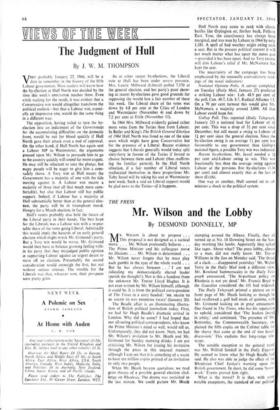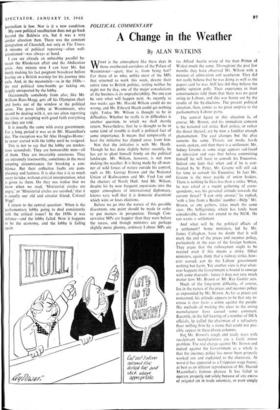THE PRESS
Mr. Wilson and the Lobby
By DESMOND DONNELLY, MP
R. WILSON is about to propose . . .
This proposal is not designed as a tactical move. . . . Mr. Wilson profoundly believes . . . The Prime Minister and his colleagues nurse no illusions. . . . Mr. Wilson is determined. . . . Mr. Wilson never forgets that he must play each gambit in the eyes of the whole world . . . But he has always foreseen . . I am not ridiculing my democratically elected leader (perish the thought!). Nor is this a handout from the unknown Mr. Trevor Lloyd Hughes. It is not even written by Mr. Wilson himself, although it could be. It is from the political correspondent of The Times in a story headed: 'MR. HEATH TO BE ASKED TO JOIN RHODESIA TALKS' (January 20).
The Beadle affair is an illuminating illustra- tion of British political journalism today. First, we had Sir Hugh Beadle's dramatic arrival in London. Why did he come? I had hoped that our all-seeing political correspondents, who know the Prime Minister's mind so well, would tell us. Unfortunately, they did not know. Next, we had Mr. Wilson's invitation to Mr. Heath and Mr. Grimond for Sunday morning drinks. I am not criticising Mr. Wilson for issuing his invitation through the press in this unusual manner; although I can see that it is something of a waste to have ten million copies printed of an invitation to only two people.
When Mr. Heath became querulous, we read grim threats of a possible general election chal- lenge on Rhodesia:The drama was sustained to the last minute. We- could picture Mr. Heath stamping around the Albany. Finally, they all turned up at No. 10 Downing Street on the Sun- day morning like lambs. Apparently they talked like sages. About what? The press lobby, almost to a man, did not really know. Mr. Trevor Williams in the Sun on Monday said, 'The threat of a clash ... disappeared yesterday.' Mr. Walter Terry in the Daily Mail took a different view, Mr. Rowland Summerscales in the Daily Tele- graph announced, The bi-partisan policy on Rhodesia is not yet dead.' Mr. Francis Boyd in the Guardian considered the rift had widened.
The Daily Telegraph printed a picture on its front page of Mr. Heath looking as though he had swallowed a golf ball made of quinine, with Mr. Grimond looking on in great amusement. Our friend in The Times, who has his reputation to uphold, considered that 'The leaders [were] in amity,' and continued, 'The presence of Mr. Bottomley, the Commonwealth Secretary, eX• plained the fifth copita on the Cabinet table for the sherry that came at the end of two hours' discussion.' This explains that long-range tele- scope.
The notable exception to the general trend was Mr. Wilfrid Sendall in the Daily Express. He seemed to know what Sir Hugh Beadle had said. He also was able to judge the effect of the Rhodesian Chief Justice's warning upon the British government. In short, he did some 'home- work.' Events proved him right.
What is the moral? It is that, with some notable exceptions, the standard of our political
journalism is low. Nor is it a new condition.
My own political recollection does not go back beyond the Baldwin era, but it was a very similar situation then. There was the constant denigration of Churchill, not only in The Times. A miasma of political reporting--often well- intentioned—was always at hand.
I can see already an unheatthy parallel be- tween the Rhodesian affair asnd the Abdication crisis. Any minute now I can hear Mr. Ian Smith making his last poignant broadcast before leaving on a British warship for his journey into exile. And, in the meanwhile—as in the 1930s— the real political time-bombs go ticking on, largely unreported by the lobby.
Occasionally somebody from afar, like Mr. William Rees-Mogg, gets off his Olympian chair and looks out of the window at the political scene. The press lobby at Westminster, who should be dealing with it, are too often reporting the trivia or accepting with good faith everything that they are told.
It is usually the same with every government. For a long period it was so in Mr. Macmillan's day. The exception was Sir Alec Douglas-Home: he never started with the lobby until he resigned.
This is not to say that the lobby are tenden- tious scoundrels. They are honourable men—all of them. They are invariably courteous. They are extremely trustworthy, sometimes in the most tempting circumstances for breaking a con- fidence. But their collective faults are com- placency and laziness. It is also that it is so much easier to take, without critical interpretation, what is given to them. Do they not realise that we know when we read, 'Ministerial circles are angry,' or 'Ministerial circles are satisfied,' that it is usually our old and circular friend, Colonel Wigg?
I return to the central question : When is the parliamentary lobby going to deal consistently with the critical issues? In the 1930s it was defence—and the lobby failed. Now it happens to be the economy, and the lobby is failing again.



































 Previous page
Previous page